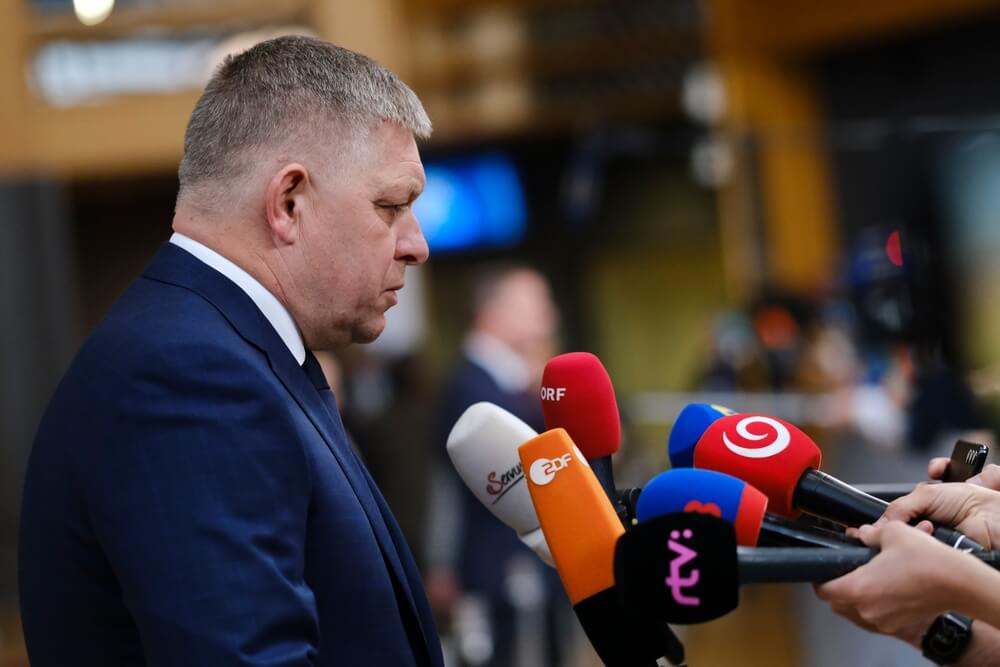The 2 contenders for the post of president of Slovakia have been rapidly searching for new reservoirs of votes before the second round of elections on April 6.
The former head of diplomacy and ambassador to the US, Ivan Korčok and the opponent, the speaker of the parliament and former prime minister Peter Pellegrini, are convinced that they have a way to attract new voters and win after a close race in the first round.
Ivan Korčok surprised everyone by receiving roughly 42% of votes and winning the first round with a difference of more than 5%, even though all the surveys predicted Mr Pellegrini would win in the first round with over 50%.
Although the president of Slovakia is elected directly in elections and has a strong legitimacy, his powers are minor and in the shadow of the government.
However, the president has a strong political authority in the country and could influence the decisions and positioning of the country in international frameworks, primarily in the EU and NATO.
Problem child
Since September, Slovakia has again been one of the "problem children" in the EU and NATO, given that the coalition of populists, Eurosceptics, and pro-Russian forces led by the current Prime Minister Robert Fico won the parliamentary elections.
After the departure of the liberal, pro-NATO and pro-EU president Zuzana Čaputová, Slovakia's political position has shifted and resists full support for Ukraine and advocates loosening European pressure on Moscow.
The concern of the majority of EU members stems from the belief that Robert Fico's government could go the way of Hungary and its leader Viktor Orbán
The candidacy of Mr Korčok, a former associate of President Čaputová, and particularly his leadership in the first election round, raised hopes for some degree of political balance in Slovakia.
The concern of the majority of EU members stems from the belief that Robert Fico's government could go the way of Hungary and its leader Viktor Orbán, whom the Slovak prime minister openly regards as a political role model.
Both are Eurosceptics, opposing broad support for Ukraine's defence against Russian aggression and resisting some significant shared European policies (like migration) by demanding more national sovereignty.
Fico's legitimacy is being questioned
Mr Korčok's victory on April 6 would not guarantee a political balance between pro-European liberals and sovereigntist Eurosceptics in Slovakia.
However, it would influence a significant revision of Fico's policy and a sort of barrier against potentially radical moves, both on the domestic scene and regarding the EU and NATO.
The victory of Ivan Korčok would indirectly question the legitimacy of Robert Fico's government, because it would show a change in the political mood in the country and alignment with the liberal pro-EU policy.
In that case, political tensions would intensify and could even result in early elections, putting Fico's populism to the test.
On the other hand, the victory of Mr Pellegrini, as a former coalition partner of Prime Minister Fico, would consolidate the dominance of Fico's politics and provide him with a solid ally in the position of President of the State during the entire mandate.
The political closeness of the Prime Minister and the President, in the event of Mr Pellegrini's victory, would indicate the full dominance of nationalist politics
This would probably represent an approval for judicial reform, but followed by the increased political influence on the judiciary, the media would be under tighter government influence, and Slovakia's foreign policy would strengthen its reservations about supporting Ukraine or a shared migrant policy.
The arrival of Mr Pellegrini would be a Slovak replay of the order that has existed in Hungary during Orbán’s 14-year term or in Poland under the conservative Law and Justice Party government of Jarosław Kaczyński, which left power in October after 8 years.
The political closeness of the Prime Minister and the President, in the event of Mr Pellegrini's victory, would indicate the full dominance of nationalist politics, reluctance to compromise within the EU, pronounced anti-migrant and anti-LGBTQ rhetoric in the public, and particularly the opposition to broad support for Ukraine.
The influence of ultra-nationalists
However, whether Slovak politics will move in that direction depends on whether the third-placed in the first election round, ultra-nationalist and prominent advocate of pro-Russian politics Štefan Harabin, would redirect his 11% of votes to Peter Pellegrini.
Since Mr Harabin regards Mr Korčok and Mr Pellegrini as liberals, he made it clear ahead of the elections that he would not support them in the second round of voting. As a result, his supporters will likely abstain on April 6. Pellegrini's ambitions, though, are focused on them.
 If the ultra-nationalists give more significant support to Mr Pellegrini, it could oblige Prime Minister Fico to increase his resistance to support for Ukraine
If the ultra-nationalists give more significant support to Mr Pellegrini, it could oblige Prime Minister Fico to increase his resistance to support for Ukraine
If the ultra-nationalists give more significant support to Mr Pellegrini, it could oblige Prime Minister Fico to increase his resistance to support for Ukraine after he has exhibited signs that he wants to take a different course.
At the end of January, Fico visited Ukraine and spoke with Prime Minister Denys Shmyhal, promised help and eased up by talking about "only minor political differences between Bratislava and Kyiv".
However, his dual political nature, where he behaves pragmatically regarding European allies, might move towards greater populism and distancing from the EU if his political partner wins on April 6.